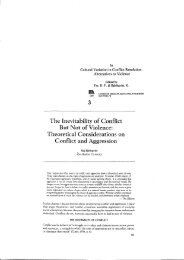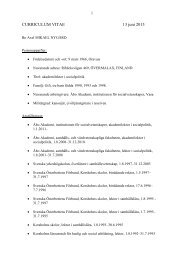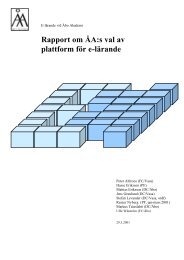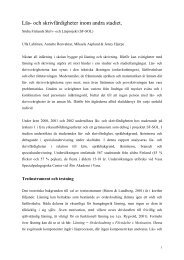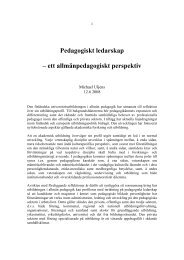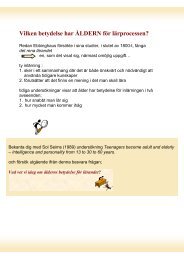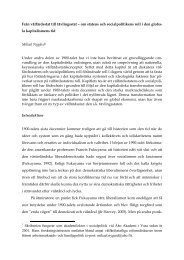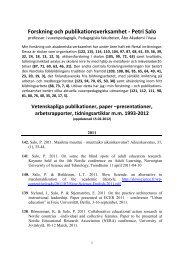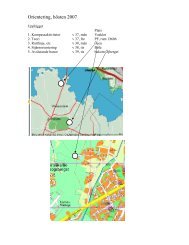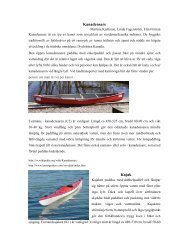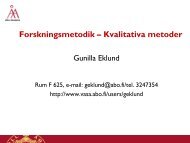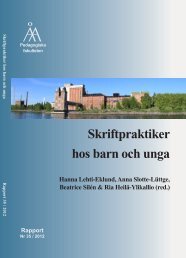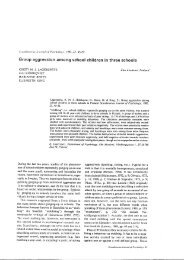Parties, Candidates and Citizens On-Line - Åbo Akademi
Parties, Candidates and Citizens On-Line - Åbo Akademi
Parties, Candidates and Citizens On-Line - Åbo Akademi
You also want an ePaper? Increase the reach of your titles
YUMPU automatically turns print PDFs into web optimized ePapers that Google loves.
et al. 2003b, 86-90; Löfgren 2001, 23-30). Hence, different parties would stress different<br />
dimensions of communication on their website depending on their general goals (cf.<br />
Norris 2003). However, Römmele remarks that her study;<br />
“…has sought to present a theoretical exposition of the ways in which<br />
parties can be expected to use the new communication tools […] Empirical<br />
studies are obviously needed to establish just how far party implementation<br />
of these tools follows the anticipated path”. (Römmele 2003, 15)<br />
Consequently, this study seeks to further explore the plausibility of this actorconstructivist<br />
view on party internet activity. The article focuses on Finnish parties’<br />
opinions concerning the importance <strong>and</strong> use of their websites <strong>and</strong> also on the actual<br />
contents of these websites. The Finnish multiparty context offers much variation in<br />
numerous party-specific characteristics (Djupsund 1990, 20; Sundberg 1996, 147-152).<br />
This provides an opportunity to take several theoretically important aspects, besides party<br />
goals, into account in exploring the actor-constructivist view. Finl<strong>and</strong> also has a high level<br />
of internet penetration <strong>and</strong> is among the world leading countries in terms of internet<br />
usage by political actors (Gibson & Römmele 2005, 10).<br />
The aim of the study is to relate both the Finnish parties’ ‘inside view’ <strong>and</strong> website<br />
output to the parties’ character in terms of several theoretically relevant aspects. The<br />
article seeks to provide an initial empirical test of the theoretical view proposed by<br />
Römmele (2003). Are the Finnish parties’ opinions concerning the importance <strong>and</strong> use of<br />
their websites, or the contents of their websites traceable to certain aspects of their<br />
character?<br />
Theoretical backdrop<br />
In this section, a theoretical backdrop is developed for the study. Drawing on the general<br />
literature on circumstances relevant to party conduct (e.g. Harmel & J<strong>and</strong>a 1994; Katz &<br />
Mair 1995; Maarek 1995; Sjöblom 1968; Strom 1990), four aspects relevant to party<br />
internet conduct, i.e. party goals, party organization, party size <strong>and</strong> resources <strong>and</strong> party<br />
voters <strong>and</strong> supporters, will be discussed <strong>and</strong> related to party websites.<br />
Party goals<br />
Political parties operate in three different arenas according to Sjöblom (1968); the internal<br />
arena, the electoral arena <strong>and</strong> the parliamentary arena. Political parties emphasize different<br />
goals in each of these arenas. Four different goals for party activity can be identified in the<br />
literature (e.g. Harmel & J<strong>and</strong>a 1994; Katz & Mair 1995; Strom 1990); vote maximization,<br />
87



